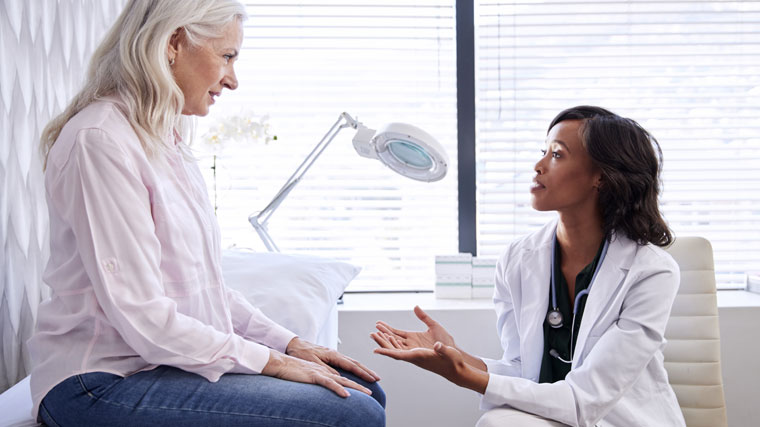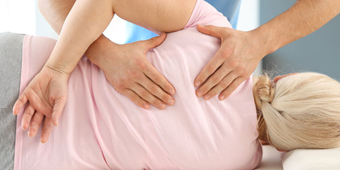Understanding Pelvic Organ Prolapse

Find Your Perfect Match
Answer a few questions and we'll provide you with a list of primary care providers that best fit your needs.
Pelvic organ prolapse happens when the muscles and tissues supporting your pelvic organs (the uterus, bladder, or rectum) become weak or loose. This allows one or more of these organs to drop or press
into or out of your vagina. You may be embarrassed to talk about it with your doctor, but don’t be. You won’t be the first! POP is fairly common. And it’s treatable.
What Are the Symptoms?
The most common symptom of POP is the pressure you feel during physical activity. Urogynecologist Dr. William Rush explains:
Click play to watch the video or read video transcript.
The symptoms of pelvic organ prolapse's are usually noticing things dropping down. Feeling a pressure or discomfort in the pelvis. A lot of women will speak of feeling like things are out of place or especially as they stand up, they feel a pulling sensation. They might feel that sensation from their lower back or more from their front. And they just describe it in very vague terms. Often times they have trouble pinpointing exact words to describe exactly how they're feeling with it. But it becomes a bother to them. They may even notice that it's not too bad with regular activity but as they try to exercise or if they are on their feet more, they go to move something or lift something, their symptoms worsen.
Who Gets POP? Who Doesn’t?
Genetics plays a role in your risk of getting POP. But there are other reasons why you may get POP. Dr. Rush explains:
Click play to watch the video or read video transcript.
The risk factors for pelvic organ prolapse is somewhat genetic, we don’t know a specific gene. But it seems to be predispositions to having weaker tissues. It’s not something you can help or change. But then on top of that, it’s having a life style where you chronically bear down. That can be from chronic coughing, it can be from a job where you’re lifting all the time or heavy exercise where you’re always bearing down. But that’s not to say that exercise is a bad thing, certain types of exercise can help strengthen the core muscles and can help reduce your chance for it. We don’t have any specific causes for it, although the more children you have, that increases your risk for it. Also the type of delivery you have can also impact that. But then again, even if you have all c-sections or no children at all, you can still have pelvic organ prolapse. It’s just less of a chance of it happening.
Is There Anything I Can Do To Prevent POP?
Can you prevent POP or keep it from getting worse? It’s a common question, says Dr. Rush. Here’s what you can do:
Click play to watch the video or read video transcript.
A common question I get is how can I prevent pelvic organ prolapse and or how can I keep pelvic organ prolapse from getting worse? And there is no absolute way to prevent it. There are certain risk factors and you are going to be exposed to those. However, doing exercises that improve your core, especially your pelvic core musculature, such as yoga or Pilates are possibly beneficial. Aerobic type exercises, they are lighter in nature, can be beneficial. And then there's specifically physical therapy for the pelvic floor. Where you see a physical therapist who will teach you exercises to do. It cannot reverse the effects of prolapse but it may be able to reduce some of the symptoms women are having from it. Or it can keep it from getting worse.
If you have (or think you have) POP, don’t be concerned that it’s a sign of something else happening. “Pelvic organ prolapse is rarely an indication of something else,” says Dr. Rush. If you have it, you likely will have urinary
leakage or may be unable to empty your bladder, he says. But there’s no reason to be concerned that POP is a sign of other problems.
Learn about treatment options for POP.
Find Your Perfect Match
Answer a few questions and we'll provide you with a list of primary care providers that best fit your needs.
Source: Office on Women’s Health (WomensHealth.gov); William Rush, MD, FACOG, Lifestages Centers for Women









